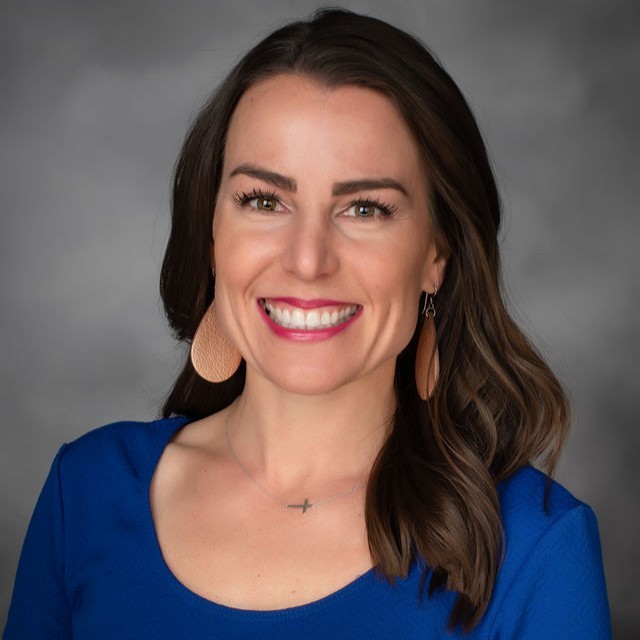Extended Care Planning with Kelly Augspurger
Extended care planning isn’t the most fun thing to think about. Kelly Augspurger talks about how to have the conversation with loved ones!
Listen to us On
About the Episode
We focused on the ins and outs of extended care planning, reframing long term care, the critical variables to consider and conversations to have, how to pay for care and figuring out who will deliver it, and how to get started, with Kelly Augspurger, LTC advocate, podcaster, and CoFounder of Steadfast Insurance.
Listen to hear a difference-making tip on a practical way to involve loved ones in the extended care planning conversation!
You can learn more about Kelly at SteadfastAgents.com, Facebook, Instagram, YouTube, and LinkedIn.
Did you get anything out of this episode? Do us a solid and leave a review:
https://ratethispodcast.com/alignedmoneyshow
Learn more and engage at MoneyAlignmentAcademy.com, Twitter, LinkedIn, Instagram, YouTube and Facebook.
Buy George G a coffee (he loves coffee)
https://www.buymeacoffee.com/lifeblood
Have George G speak
https://moneyalignmentacademy.com/speaking/
Financial literacy and wellness for individuals, families, and companies
https://moneyalignmentacademy.com/
Find George G’s books here
The Aligned Money Show is the podcast for Money Alignment Academy, copyright 2024.

George Grombacher
Host

Kelly Augspurger
Guest
Episode Transcript
george grombacher 0:02
Kelly to get us started. Give us two truths and a lie, please.
Kelly Augspurger 0:07
All right, George. I drive a minivan. I’m five feet tall. And I was an all American athlete.
george grombacher 0:15
Wow. Those are awesome. Drive a minivan. You’re five feet tall. You’re an All American athletes. Oh my goodness. I’m pretty sure that you are not. Well, I don’t want to say this bad. I don’t think that you’re as tall as I am. So I think that you might be five foot tall. But he I don’t think he drove a minivan. Okay,
Kelly Augspurger 0:42
is that your final answer? Yes. It’s true. It’s true, George. Am I too cool for a minivan? I probably give off that vibe. Right? I’m so cool for a minivan. No, I love my minivan. I have a Honda Odyssey. It’s a 2014. I’ve had it for years. I love it. I’m gonna drive it until it dies, or until my kids are out of high school, which I’ve got like another seven years. All
george grombacher 1:06
right. All right, then. Well see the thing about being too cool for a minivan which you certainly are. It means that you’re cool enough to absolutely drive a minivan and not have any problem. In fact, you embrace it, and you think it’s awesome. You’re gonna drive it forever. So
Kelly Augspurger 1:20
oh my gosh, it’s so practical. It’s so practical. It’s easy. I love it. Yeah. Big honda odyssey fan here. So what’s my lie? Do you know? Well, I
george grombacher 1:29
think you’re five feet tall.
Kelly Augspurger 1:31
I’m not. I’m close. I’m close. I’m sorry. I’m five. One and a half. Okay. Yeah. But at almost age 40. We don’t really, you know, say the haps anymore. So I’m 5151
george grombacher 1:42
for sure. And for the for the athletic background.
Kelly Augspurger 1:47
True. True. I played tennis in college. You’re an All American tennis player. Two time all American Hall of Famer here. Congratulations. Thanks. Thanks. That’s all fine. Fun season.
george grombacher 2:00
Where did you play?
Kelly Augspurger 2:01
I played at Ohio Wesleyan. It’s a it’s a school in Delaware, Ohio. So nice. Far from where I am now. Yeah.
george grombacher 2:08
Okay. Well, that’s awesome. We should I played tennis in college as well. I was nowhere nowhere near being an All American.
Kelly Augspurger 2:16
I did know that. I know your tennis background. Do you play pickleball now?
george grombacher 2:20
I am just getting into it.
Kelly Augspurger 2:23
Oh, my gosh, I love it. I don’t even play tennis anymore. I exclusively play pickleball. We could talk about this off there probably for hours.
george grombacher 2:30
No, I think yeah. This is great. So do you dominate on the pickleball? Court? I’m sure you do. Don’t be shy or modest. Yeah, so
Kelly Augspurger 2:40
I do pretty well. I do pretty well on the pickleball. Court. Yeah. Yeah. I would love to play some tournaments. But you know, that’s a time commitment. Right.
george grombacher 2:48
Right. So you said you’re almost 40. So my thought process is I’m 45. I’m like, Okay, I’m going to start training. And I think maybe I could compete for a national championship at like, 50, you know, the, like, age 50. And then 60. For sure. If I can, you know, maintain my physical well being now, it could be the dumbest thing that anybody’s ever heard ever, but no,
Kelly Augspurger 3:14
I don’t think it is at all, George. And I think when you’ve got a tennis background, it’s like so natural. It’s like a mix between tennis and ping pong. Yeah. Yeah.
george grombacher 3:22
It’s just so fun. Yeah. All right. So you smoke me. I was. I was wrong on two out of three. So congratulations on being an All American two time tennis player. I think that that’s awesome. And what’s also very instructive about who you are as a person that are no, you can take that as a compliment or whatever.
Speaker 1 3:43
Competitive maybe a little bit. Yeah, sure. Yeah. A bit competitive. I
Kelly Augspurger 3:47
love to have fun. Yeah,
george grombacher 3:49
I get it. All right. Cool. So aside from all that stuff, what is top of mind for you right now? Yeah,
Kelly Augspurger 3:55
something that is usually top of mind for me, George, is that I think as a country, we are doing a terrible job of planning for extended care, also known as long term care. So, you know, if you think about it, as Americans, we plan for a lot of things. And we spend a lot of time planning for things like vacations, right? Like a lot of us to maybe take a week, week vacay at least a week vacation once a year, we go somewhere, we probably spend hours just planning that vacation. We’re planning probably for kids college for retirement, right, lots of different things. But we typically fail to plan for the one thing that can really derail our financial plan, and cause really serious consequences to our family. And that is if we need extended care if we need help throughout the day. So you know, that’s something that I’m on a crusade about is to help educate, not just financial planners, but people in general Americans about the importance of planning we need to plan you know what half begins if we need help as we get older or all of a sudden due to an illness or injury, but most often when we need care, it’s typically later in life, you know, maybe 80 Plus where we need some assistance. So if we don’t have a plan in place, and I don’t mean insurance, I’m just speaking in general, if we don’t have a plan of who’s going to provide care and coordinate care, where do we want to receive care? And how are we going to pay for that care? It’s really difficult because you’re crisis planning. And when we crisis plan, we tend to make bad decisions. Right? For in that crisis, we’re usually pretty emotional or making decisions that maybe we wouldn’t have, if we would have planned in advance. So that’s top of mind for me.
george grombacher 5:47
And as you are on a crusade, I’m sure that it is right at the top of your mind every day. So I respect and appreciate that. We all now, when I say we, I mean me, I’ve known for a really long time how important it is to set goals. Yet it took me until I was 35 to actually do it. Now, obviously, it works out. But it’s so true. We do make plans for vacations, but I don’t know how many people are really planning for retirement, and certainly far few are planning for the possibility of extended care. And I want to talk a lot about that. But how do we how do people How do you? How do we get their attention? Is there a reframe that we need to do? Because I don’t want to talk about, you know, having to have somebody move me to the toilet or get me out of bed or feed me or get me dressed? Yeah,
Kelly Augspurger 6:41
there is a reframe for sure. Yeah, I think when people will first off when people hear the term Long Term Care, there’s usually some negative connotations and misperceptions of what it is and what it isn’t. And so let’s just talk about that. Okay, so when we’re talking about long term care, this is not nursing home, it can be. But typically, when we’re talking about planning for extended care, we’re talking about if you need assistance throughout the day with either physical things. So these are called activities of daily living. And they’re six specific ones transferring toileting, bathing, dressing, eating incontinence. So if we need help with those, that’s long term care, that’s extended care, or if we need supervision, because we have a cognitive impairment. So maybe we develop dementia, Alzheimer’s, Parkinson’s, right, it’s more and more common lately. And so if that happens, you know, do we have someone to supervise us to make sure we are safe and others around us are safe, because we often see with cognitive impairments, a flight risk is huge, you know, just walking out the front door and going down the street and forgetting where you are and what you’re doing. And so definitely, that supervision is important. And so that’s really what we’re talking about when we’re talking about extended care. And so I think people, you know, we need to kind of put aside the nursing home, because that’s the last stop if you ever even have to do that. But ideally, if we come up with a plan, we don’t even have to go there. If we come up with a plan, the goal is to stay in control of our care options, right and be able to choose where we want to receive care what kind of quality care we want, who those caregivers are going to be and how we’re going to pay for that. But if you don’t have these conversations in advance, and it comes to a crisis, where mom or dad just had a stroke, what do we do? We have not talked about this before, right, what their wishes are, how they’re going to pay for this, you know, who they want to provide care, then you’re just you’re blindly making these decisions, and usually they’re emotional, irrational decisions. So reframing the conversation to okay, this is not nursing home, right, this is we’re just if we need help, that’s what we’re talking about. And then also thinking this is not just about money. Okay, we know that if we need care, it can be expensive. And just to kind of give you some some numbers to throw out George, I’m in Ohio. So if we look at Ohio, and we say okay, if I want some homecare per month, today’s dollars, how much might I pay? Okay, if I’m receiving approximately 44 hours of care per month, or I’m sorry, per week, on a monthly basis in Ohio, you’re looking at probably about $5,000 a month. Okay, that’s probably pretty typical. If we’re in assisted living, it’s going to be probably more maybe we’re closer to 6000. Okay, if we’re in a skilled nursing facility, that’s a nursing home, we’re looking at maybe eight 9000. Okay, but also that’s the last place we want to be so we’re not even going to go there. Right. But to give you an idea, okay, yes, we know it’s expensive. Okay. But there’s more to it than that. When we need care. This doesn’t just affect us as the person that needs the care. This affects people around us. All right. So if we have a partner or spouse, if we have children, we have extended family, we have neighbors, heck, even neighbors. I mean, this really does affect more people. Because if we don’t have a plan, and we’re just expecting our family to pitch in and help us. That’s a, that’s a big ask, right? I mean, there are really consequences and burdens there that you may not intend. Right? So if if something happens, and I need care, you know, is my husband gonna step in and quit his job or take time off of work? Or, you know, if my parents need care, I can’t do that, you know, I can’t just quit my job and, and all of a sudden be a full time caregiver. I can’t, nor do I want to, nor do they want me to be. So what’s the plan for our family? What’s the plan for us financially? Those are the things that need to be considered. It doesn’t people, I think, focus too much, George on statistics, you know, like, how much care do people need? What’s the average? Well, those numbers are out there. But we’re not average. So you know, we could look at numbers all day long. You know, let’s say the average for women’s four years, which it’s about four years, okay? Well, I might only need a year, I might need eight years. Right? Regardless of the time, because we don’t know, we don’t have a magic eight ball that says this is how much care we’re going to need. Right? And for how long? But if we can come up with a plan to say, Okay, well, at least we’re having this discussion with our family, you know, our partner, our kids, our POA, you know, they need to know what our wishes are, we need to document this we need to write this down, have a written plan of care? What are our goals? What are our wishes, what is tangible? What can we actually do what’s practical, you know, I might want to stay in my home. But I have a two story home. And that might not be realistic. So maybe that means, you know, I’m going to have to downsize and move to a, you know, a ranch or something like that. So what are different pieces, moving pieces, George. But I think if we reframe it from where we’re protecting the family and the finances, we’re coming up with a plan in advance to mitigate those consequences. We’re not focusing on statistics, you know, this is really about what happens to the people we love. If we need care, that’s what it comes down to. How do we best protect best protect both our family and our finances, you got to have a plan.
george grombacher 12:46
Think it’s a really sobering thing to to put ourselves in the shoes of our of our future self, God willing, I’ll be an old version of me someday, and I will maybe slow down and require some kind of an extended care situation. So making a plan for that. For me, I wouldn’t want my kids and I would consider it to be a burden. And that’s just me, I would not want to burden them with having to care for me. Is that common? I’m sure there’s people out there that think I raised you, you will take care of me or and there’s kids that are probably thinking, I want to take care of mom or dad.
Kelly Augspurger 13:29
Yeah, no, I think your perspective, George is the most common. Most parents don’t want to be a burden to their kids. Now, culturally, depending on, you know, how you were raised, and different ethnic groups sometimes have different expectations. And in you know, what, how they foresee the future going, but typically, most parents are of the mind of Yeah, I don’t want to be a burden to my kids. How do we how do we put a plan in place so that they don’t have to be a caregiver to me, you know, knowing okay, my kids have their own lives, they probably they might have kids, they have jobs, I can’t expect them to physically provide care, right? Maybe we can have kids involved in some capacity where they’re helping to coordinate some care, you know, maybe make some phone calls, you know, maybe it’s providing some meals, occasionally those types of things. But when you’re asking others, other family members to physically provide care day in and day out, that’s a big ask. And most people don’t want to ask their loved ones to do that. They would rather have professionals who are trained to do that. That way their family members can remain their family members. Right their spouse can remain their spouse or kids can remain their kids and not they’re also their full time caregiver
george grombacher 14:46
is one of those things where it’s such an interesting, it could be brief could be probably a longer it’s deserving of a good amount of thoughts and for lack of a better term soul searching, say okay, what do I really They want where do I want to receive care? You know, all of those things? Who do I want to deliver it? And maybe it comes out that yeah, I would like my son James, to do it or my, my, my daughter to do it or I’d like her to or he asked him to, to sort of spearheaded it, but not be involved with it. And oh, by the way, we should probably ask James or Joe and say, Hey, how do you feel about being involved with this? Yeah, because I have no idea. Maybe they’d say that, that’d be great. I would love to do that. And they’d say, I don’t want to have anything to do with that. Yeah.
Kelly Augspurger 15:36
And it starts with a conversation. It does, it just starts with a conversation with your family members, you know, talking about your preferences, talking about their preferences, it isn’t even logistically possible, you know, maybe you are wanting your kids to be involved, but they don’t even live in the same town. That would mean that they’re moving, right, or they’re traveling distances to take care of you. So you have to have these conversations with your family, the who, the where, and then the how, and then, you know, my my day job is helping people plan for extended care, and then looking at long term care insurance, to see if this is a viable solution to be able to help pay for care. So you know, if we’re looking at the how we’re going to pay for it, the default plan, George is self funding, most people pay for care out of pocket, right, they’re just dollar for dollar, every dollar that, you know, they have there, they’re using to help pay for care. They’re not, they’re not getting leverage on those dollars, if we’re just solely self funding. So most of my clients end up doing kind of a split, where we call it co funding, they’re, they’re planning to, they have a policy. So that’s their base or their foundation, and then anything above what their policy doesn’t cover their CO funding with their other income and investments. And that’s usually a great way to buy coverage because you get a meaningful amount, but it’s also affordable. Right? And then knowing Okay, well, I’ve got this to depend on. And then anything above, okay, I’ve got other Social Security pension investments that I can use to fill in the gaps.
george grombacher 17:12
Do you find that I can see getting stuck on immediately, how am I going to pay for this? And it’s like Forest to the trees kind of a thing? Is it better to just let’s take a big step back and think about and answer those big questions, who the where, and then we’ll figure out how to how to pay for it.
Kelly Augspurger 17:35
So generally, we do it all the same time, George. So when I’m meeting with clients, these are things that we’re discussing. So I asked them, What are your preferences on the who, right? Obviously, they still need to talk to their family, like their kids. But what are your preferences? And what do you think your kids want to do? If you have kids? Do you think they want to be involved? Okay, let’s identify that who? Okay, now let’s talk about where where do you want to receive care? Where do you think it’s practical for you to receive care? Right? Would you mind? Okay, you’re, maybe most people say I want to receive care at home? That’s the number one place most people say which makes sense, right? Are the homes comfortable, we love our home, we want to be in our home. But what if you need an exorbitant amount of care, and it’s 24/7. At that point, it might make sense to move to an assisted living where care is provided it’s there, right throughout the day. And you can help to control some of those expenses, versus receiving 24 hours of care at home. You know, it’s an hourly rate. And that’s expensive. It could be $20,000 a month. So, you know, sometimes it’s Well, yes, okay. Ideally, we receive care at home, but if we have to, financially, and if it makes sense, we move to assisted living, or George, maybe it’s, you know, one spouse becomes a widow, and they don’t want to be home alone, because it’s lonely, you know, and it can lead to depression. And actually, in assisted living can be like a breath of fresh air for everybody involved, including the person that needs care, because they get socialization activities, right meals, provided laundry, all those types of things. So we’re identifying that and then we’re also identifying the how we talk about finances, what do you have, what do you expect you’ll have in retirement? What kind of income are we looking at? Okay, now, let’s put these things together. Does it make sense to reposition some, some money that we have in order to get a policy either as a portion of your income, you know, each year, or it’s, you know, a one lump sum or it’s over a 10 year period of time? There are lots of different ways to do it, George, but we’re discussing all of these things together.
george grombacher 19:42
That makes sense. Like it. Well, Kelly, we’re ready for that difference making tip. What do you have for us?
Kelly Augspurger 19:48
Yeah, so it goes along, George with what we’ve been talking about, get a plan together. You have to be proactive, don’t be reactive, be proactive and come up But the plan for extended care. And also with that extended care plan, George combs an estate plan those go hand in hand. So you know, work with a qualified attorney, estate planning attorney to get those documents in place and some things that I would encourage you to look at our, you know, your basic will living will power of attorneys we’ve got, you know, financial power of attorneys in health care, power of attorneys, those are musts, those those need to be put in place. And then you know, maybe a trust, if that fits your situation, I’m not qualified to say if it does or doesn’t, but you meet with an attorney to figure that out. But those estate plans really go hand in hand with your extended care plan. So you know, get those two things together, keep them in a file, and make sure your family knows where these documents are. So that they can access them when they’re needed. It’s great to have the plan. But if you don’t tell anybody about the plan, it doesn’t do anybody any good. Right, so communicate with your family or your POA whoever you know, is in your life of what your your preferences are documented, I actually have a resource and I’m happy to share it with any of your viewers, George for free. It’s, it’s a family roadmap is what I call it. And it’s a guide to extended care planning and end of life planning. And it’s a 40 Plus page document that has fillable space for you to document these kinds of things. And then it gives you tips on end of life. You know, the first six months, what do you do after a loved one passes? Here’s some things that need to be considered. So highly suggest come up with come up with that extended care plan and estate plan both
george grombacher 21:37
ways you could that is great stuff that definitely gets calm. Kelly, thank you. Thank you so much for coming on. Where can people learn more about you? How can they engage? Where can they get their copy of the family roadmap? Yeah,
Kelly Augspurger 21:51
so feel free to if you’re on LinkedIn, you can find me on LinkedIn Kelly, Augspurger, Aug. SP is and Paul you are G R. You can connect with me there you can also reach me by email Kelly, ke l EY at steadfast agents with an s.com. You can find me also on our website, steadfast, agents.com. Those are all great places to reach me. And I also have a podcast George steadfast care planning. So if you want to learn more about extended care planning, and I talk a lot about that, and I talk about how to really meet head on issues that older adults are facing, how do we navigate these issues? I talk about that on my podcast. Love
george grombacher 22:33
it. If you enjoyed as much as I did, she’ll kill your appreciation. share today’s show with a friend who also appreciates good ideas, go to steadfast agents.com and get your copy of that family roadmap, listen to the steadfast care planning podcast, find Kelly on LinkedIn, link all of those in the notes of the show and get started with this process just because because it’s never going to be a right time or a great time to do it. But the worst time is when you are in a crisis. So be proactive. Get started. Reach out to Kelly. Thanks again, Kelly.
Kelly Augspurger 23:11
Thanks, George.
george grombacher 23:13
Till next time finally, a friendly reminder never gonna be anybody more interested in your financial success than you are. So act accordingly.
More Episodes
Shame On You: Overcoming Money Shame
Shame On You: Overcoming Money Shame When was the last time you told or thought to yourself, "Shame on you?" If it was about money, here's how you can overcome those feelings.About the EpisodeWhen was the last time you told or thought to yourself, "Shame on you?"...
Financial Literacy for Kids
Financial Literacy for Kids Financial literacy for kids is an important and challenging undertaking. We all want to help young people succeed, but how best to do it? George talks about what some governments are trying to do, and what you can start doing immediately...
Stop Saying I Hate Money
Stop Saying "I Hate Money" When you say, "I hate money," you're setting yourself for personal financial trouble. If you feel that way, it's time to reprogram your thinking.About the EpisodeHave you ever said or felt, “I hate money?” It’s easy and common to feel that...
Understanding Employee Financial Wellness
Understanding Employee Financial Wellness What is employee financial wellness, really? Is it a 401(k) open enrollment meeting? A powerpoint about asset allocation? It's all about changing behavior.About the EpisodeWhat is employee financial wellness, really? Is it a...
Money Stress is Killing Me: What to Do
Understanding Employee Financial Wellness What is employee financial wellness, really? Is it a 401(k) open enrollment meeting? A powerpoint about asset allocation? It's all about changing behavior.About the EpisodeWhat is employee financial wellness, really? Is it a...
Stop Trading Stocks
Stop Trading Stocks Should you start or stop trading stocks? Is it possible to get rich doing it? George talks about the realities of wealth building and when it’s time to invest in passive versus active investments.About the EpisodeShould you start or stop trading...
Quick Tips for a Refreshing Home Makeover
If you're looking to breathe new life into your living space, then you've come to the right place. Reviving and refreshing your home can be a fun and rewarding experience, and it doesn't have to break the bank. Whether you're looking to sell your property or simply...
How to Live a Purpose Driven Life
What is a purpose driven life? “The purpose of life, as far as I can tell… is to find a mode of being that’s so meaningful that the fact that life is suffering is no longer relevant.” - Jordan Peterson Peterson goes on to talk about how meaning and purpose is found in...
Real Employee Financial Wellness
Financial wellness is a great idea in theory, but a failure in practice. I encourage you to replace financial wellness with financial peace of mind. Most of us don’t want to spend a ton of time thinking about money. Yet currently, most of us are stressed and...
Join the show.
Interested in being on the show? Tell me a little bit more about you and what you’d like to talk about!














